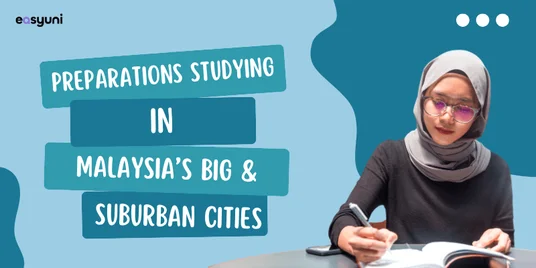Support Yourself Through University With Financial Aid
November 11, 2017
EasyUni Staff
Students and parents often worry about education financing. Some students even give up their preferred choice of career or institution of learning due to lack of funds, while others only start looking for financial assistance or scholarships upon acceptance by their university of choice. Ambitions and dreams need not be buried simply because of a poorer financial background, as there are many means to get you through until you graduate.
Financial assistance is often offered by governmental bodies, non-profit organisations (NGOs), educational institutions, or the private sector as part of their corporate social responsibility (CSR) initiatives. Assistance may come in the form of a scholarship or a full or partial loan. Some loans may be converted into a scholarship if excellent academic results are achieved. Having your college or university fees disbursed enables you to pursue your education without financial hindrances. Student financial aids, or more commonly referred to as student loans, are also the best form of financial assistance for the pursuit of higher education for the following reasons: Low interest rate Tailored to encourage the pursuit of knowledge, the interest charged on student loans are usually very minimal, ranging from 1% to 6%. The interest rate generally remains flat throughout the tenure of the studies and extends past its completion, so students need not worry about the rate increasing along with inflation. Some NGOs even disburse interest-free loans. Flexible payment terms A student’s financial difficulties are very much understood, therefore student loan repayment schemes are often very flexible. Students usually have an average grace period of six months upon graduation to start repaying their loans, which can also be delayed if employment has yet to be found. The instalments are also generally minimal to reduce the financial burdens of students. Convenient payment options Loan repayment is made easy for students; payment is often accepted via different channels, be it bank transfer or cheque at various payment counters at the loan disbursement centre, banks, post offices and other collection agencies. Students can also arrange for a scheduled deduction to be made from their monthly salaries, enabling payment to be made punctually and hassle-free. Covers living expenses and education necessities Certain student loans cover more than just the tuition fees; some include a little extra for books, stationery and study tools. Living expenses such as rent, utilities, food and Internet access can be managed with this extra funding too. Helps to build credit A record of having taken a student loan and, of course, paying it off diligently is a good credit record that you’ll need when you apply for subsequent loans, be it a personal, home or automobile loan. Banks that have accessed your good repayment history will be more confident in offering you a loan if they are convinced that you can pay it all back. 
Education financial assistance, wherever you may go
Every country would have its fair share of lenders, all willing to offer financial assistance to deserving students. In this issue, we’ll take a look at your options of student loans available should you choose to further your studies in India, Indonesia, Singapore, Sri Lanka and Malaysia.
Malaysia
Koperasi Jayadiri Malaysia Berhad (KOJADI) Koperasi Jayadiri Malaysia Berhad (KOJADI) was established in 1981 to extend fi nancial aid to its members to pursue tertiary education. The idea to set up the foundation was mooted as a response for many students having to further their studies abroad due to their inability to secure one of the limited number of seats in local universities. KOJADI has a total 12 loan schemes under its loan programme to cater for a wide range of vocational, technical, undergraduate and postgraduate courses. Some of the fi nancial aids include the KOJADI Higher Education Loan Scheme (HELS), KOJADI Education Loan Scheme For Students of Foundation Programmes (S-PUF), JADI Education Loan Scheme for Local University Studies (S-LUS), KOJADI Education Loan Scheme for Foreign University Studies (S-FUS), KOJADI Education Loan Scheme for Overseas Postgraduate Studies (S- OPS) and the KOJADI Education Loan Scheme for Local Postgraduate Studies (S-LPS).
National Higher Education Fund Corporation (PTPTN) The National Higher Education Fund Corporation was established under the National Higher Education Fund Corporation Act 1997 (Act 566) and commenced operations in November 1997. The body was set up as an agency of the Education Ministry of Malaysia with the role of providing and managing education savings schemes and funds for tertiary education. Students may apply for partial of full loans for the pursuit of studies either locally or abroad at both private and public universities.
Skim Prihatin Pendidikan 1Malaysia (SPP1M) The Skim Prihatin Pendidikan 1Malaysia (SPP1M) serves as an additional fi nancial aid to loans received from other organisations such as PTPTN. The scheme was launched by the Prime Minister YAB Dato’ Sri Najib Tun Haji Abdul Razak in February 2013 and is open to all students pursuing bachelors’ degree and master’s degree courses locally and abroad. The loan amount disbursed are up to RM150,000 for medicine and pharmacy programmes, and RM100,000 for business, law, fi nance, banking, accounting, engineering, architecture, science and computer science courses.
India

Credila
Credila is the only lender in India focusing exclusively on education loans. Credila is a finance subsidiary of the Housing Development Finance Corporation Limited (HDFC), one of India’s leading financial services company. Credila assists students who want to further their studies locally and abroad, as well as those who are already in the US. Credila participates in every phase involved in the application of the student loan, from origination and underwriting until the servicing and collection.
State Bank of India (SBI)
Student Loan Scheme The State Bank of India (SBI) offers loans to local Indian students who wish to further their education locally or abroad. Courses include regular technical courses, professional degree/diploma programmes, teacher training, nursing courses, vocational training and skill development courses. The loan will cover tuition fees, examination/library/lab fees, books and instruments, travel expenses for studies abroad and the cost of a two-wheel vehicle. The loan also covers other expenses incurred during the course of the study, such as study tours and project work.
Indonesia

DANAdidik
As Indonesia’s first people-to-people (P2P) student loan, DANAdidik aims to extend the opportunity to receive a loan to students who do not have a financially stable guarantor. DANAdidik works by connecting students with prospective investors with the financial capability and willingness to support the students’ higher education. Applications are open annually to any student; students would present his/her case to investors who would review the loan listings and select a sponsored student that meets their criteria. Through this P2P model, investors obtain a social investment, a diversified portfolio and the first right to hire applicants, while benefiting students who can now further their studies with given funding.
Sampoerna Foundation
Sampoerna Foundation partners with the International Finance Corporation (IFC) and PT Bank Internasional Indonesia Tbk (BII) to form Indonesia’s first private financing facility for education loans. Sampoerna Foundation, the largest philanthropic organisation in Indonesia, focuses on providing scholarships to students and this collaboration with two financial organisations will see deserving students receive loans for tuition and entrance fees of up to US$1,000. A total grant of US$2.75 million will enable 20,000 students to pursue their higher education.
Singapore

MENDAKI Study Loan Full-Time Scheme
The MENDAKI Study Loan Full-Time Scheme is an initiative offered by Yayasan Mendaki to uplift the educational performance of Singaporean Muslims. Needy and deserving students who have gained admission into selected accredited local private institutions of higher learning, art colleges and local government tertiary institutions such as Ngee Ann Polytechnic, Nanyang Polytechnic, National University of Singapore and Nanyang Technological University/NIE will receive interest-free loans to pursue their degrees and diplomas.
Tuition Fee Loan (TFL) and MOE Study Loan (SL)
The Tuition Fee Loan (TFL) is a government loan scheme to assist students in funding their tertiary education. The TFL covers up to 90% of the tuition fees; students can also choose to receive loans of 30%, 50% or 80% of the fee amount. The courses covered under the scheme varies from university to university; for instance, only full-time and part- time graduate research students at the National University of Singapore (NUS) may apply for the loan whereas students at degree level at SIM University (UniSIM) are also entitled to education loans.
The Study Loan (SL) complements the TFL by providing loans to cover the remaining 10% of tuition fees not covered by the TFL. SL is available to Singaporeans studying for MOE-subsidised undergraduate degree programmes at UniSIM, who have applied for the TFL or a loan with any registered government organisation. There are two tiers of study loans in the scheme which determines the interest charged on the loan taken. Under the Tier 1 Study Loan scheme, interest will only be applied after the fi fth year of repayment on the outstanding balance while under the Tier 2 Study Loan scheme, interest will commence from the third month of loan repayment after graduation.
Sri Lanka

Nenasa Educational Loan – DFCC Vardhana Bank, Sri Lanka
This loan scheme for both undergraduate and postgraduate studies provides a loan installment that fits your budget with a repayment period of up to ten years. It also has attractive interest rate options with a choice of fixed or variable interest rates said to be unmatched in the market. It also provides a speedy approval process, has minimal conditions, and is available throughout all DFCC Vardhana Bank branches. Students can apply for this loan individually or jointly with their parents.
HNB (Hatton National Bank) - FUTUR+ Higher Educational Loan Scheme
The HNB FUTUR+ Higher Educational Loans Scheme supports pursuit of excellence with local and foreign educational institutes or universities. Loans can be applied for in the name of the student or jointly with a co-borrower. Students below 18 years of age following academic studies at local and international schools are eligible for various subjects in the local or international institutions. HNB offers its customers very attractive and competitive, fixed or floating interest rates with the flexibility to best suit your needs. Opt for floating interest rates and your interest payment will be based on the going market rate which is subject to a quarterly review.
Before you sign a loan agreement, be aware of the following:
Your debt can last for years As the repayment installments are small, paying off a loan in full can take years. Some loans offer a tenure of up to 15 years. However, you can always shorten the length of repayment by increasing the amount paid in each installment or even pay off the loan in a lump sum if your financial abilities permit you to do so. That may also save you on interest rates. Loan to be repaid regardless of study completion Students often have the misconception that they do not have to repay their loans if they did not complete their studies. The money would have been disbursed to either yourself or the education institution, as such the loaned amount must be repaid even if you have left the university. Student loans can ruin your credit This is, of course, if you have not been servicing your loan. Many organisations have gone to great lengths to recover disbursed financial aid, to the extent of barring loan defaulters from leaving the country. Therefore, if you fail to notify your lender of a delay in repayment, not only will you have a lesser likelihood of securing a loan from banks when you need one but you may also face legal action. However, these consequences should not deter any student from taking a student loan as long as they repay their loans according to schedule.
Kickstart your education in Malaysia
We'll help you find and apply for your dream university
You might be interested in...
- Raising Awareness of the Threat of Microplastics Pollution on International Mother Earth Day
- Essential Tips for International Students Studying in Malaysia's Big and Suburban Cities
- Misconceptions About Studying in Malaysia: Insights for International Students
- The Role of Education in Promoting Health Equity: Lessons from World Health Day 2024
- Studying Abroad Tips: What Should You Do Before Coming to Malaysia?
- International Students' Guide to Success in Malaysian Research Programs
- Returning Home or Staying Put: Planning Your Career Path After Studying in Malaysia
- Crafting a Greener Tomorrow: Empowering Change through Zero Waste and Upcycling Practices
- Malaysian Higher Education's Global Outreach: Collaborations with International Institutions
- Initiatives by Universities in Malaysia to Prepare Students for Globalization










